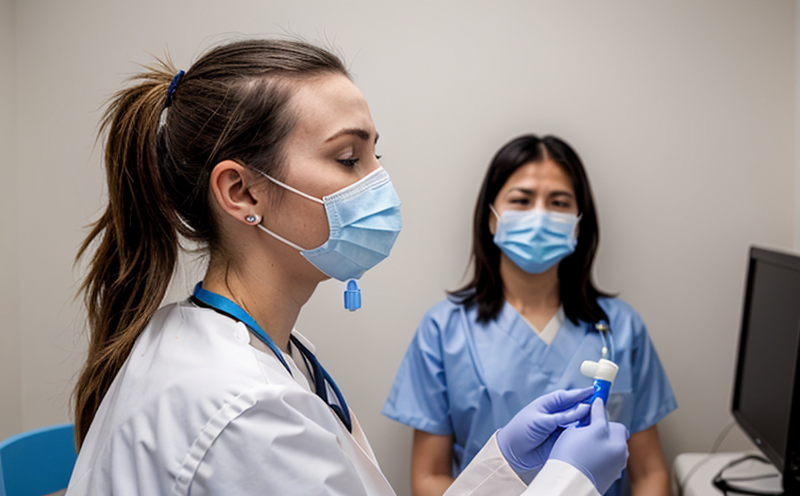PCR Testing for Novel Respiratory Pathogens in Veterinary Research
The advent of novel respiratory pathogens has underscored the critical need for robust and precise diagnostic tools to support veterinary research. Polymerase Chain Reaction (PCR) testing offers unparalleled sensitivity, specificity, and speed, making it an indispensable tool in the detection of these emerging pathogens.
Our PCR testing services are designed specifically for the identification and quantification of novel respiratory pathogens affecting veterinary populations. This service is essential for both diagnostic accuracy and research purposes, ensuring that healthcare professionals can swiftly identify infectious agents and initiate appropriate therapeutic interventions.
The process involves the extraction of nucleic acids from clinical specimens such as nasal swabs or bronchoalveolar lavage fluids. These samples are then processed using advanced qPCR technology to amplify specific target sequences associated with known respiratory pathogens. The use of real-time PCR allows for the detection and quantification of these targets, providing precise data on pathogen load and distribution.
The importance of this service extends beyond mere diagnosis; it plays a pivotal role in understanding the epidemiology of emerging diseases within veterinary populations. By identifying patterns of transmission and resistance, researchers can develop targeted interventions to mitigate outbreaks and improve public health outcomes.
Our laboratory adheres strictly to international standards such as ISO 17025 for method validation and accuracy, ensuring that our results are reliable and reproducible. This commitment to quality is reflected in the precision of our data, which forms the backbone of effective research strategies.
| Sample Type | Target Pathogen | Methodology |
|---|---|---|
| Nasal Swab | H5N1 Influenza Virus | Real-time qPCR |
| Bronchoalveolar Lavage Fluid | MERS Coronavirus | Reverse Transcription PCR |
The specificity and sensitivity of our PCR tests are enhanced through the use of validated primers and probes, ensuring accurate differentiation between closely related species. This is particularly important in the context of novel pathogens where traditional diagnostic methods may lack the discriminatory power necessary for precise identification.
Our service also includes a comprehensive report detailing the methodology used, the results achieved, and any relevant biological insights derived from the analysis. These reports are invaluable tools for researchers aiming to refine their understanding of pathogen behavior and develop effective countermeasures.
Industry Applications
The application of PCR testing in veterinary research is multifaceted, encompassing a range of critical areas:
| Application | Description |
|---|---|
| Epidemiological Studies | Tracking the spread and evolution of pathogens within animal populations. |
| Pharmacovigilance | Identifying adverse drug reactions related to respiratory health issues. |
In addition, PCR testing is instrumental in:
- Evaluating the efficacy of vaccines and therapeutics against novel pathogens.
- Monitoring resistance patterns to antibiotics and other treatments.
- Supporting outbreak management strategies by providing rapid diagnostic insights.
- Facilitating the development of targeted therapies for specific pathogen strains.
Why Choose This Test
High Sensitivity and Specificity: PCR tests can detect even minute amounts of genetic material, ensuring accurate identification of pathogens.
Quick Turnaround Times: Results are available within hours, enabling timely interventions in outbreak scenarios.
Cost-Effective: While initial setup costs may be high, the long-term savings from reduced diagnostic errors and targeted treatments justify this investment.
Comprehensive Reporting: Detailed reports provide researchers with a wealth of data to support their studies.
The reliability of our PCR testing service is further bolstered by our adherence to stringent quality control measures, ensuring that every test meets the highest standards of accuracy and precision.
Environmental and Sustainability Contributions
The use of PCR testing in veterinary research contributes positively to environmental sustainability by:
Reducing the need for extensive animal sampling through precise diagnostic methods.
Facilitating the development of targeted therapies that minimize unnecessary treatment regimens and reduce waste.
The technology also supports sustainable practices in research and diagnostics by minimizing the use of broad-spectrum antibiotics, thus reducing antibiotic resistance. By providing accurate and rapid diagnostic insights, PCR testing helps optimize resource allocation and improve the efficiency of veterinary healthcare services.





